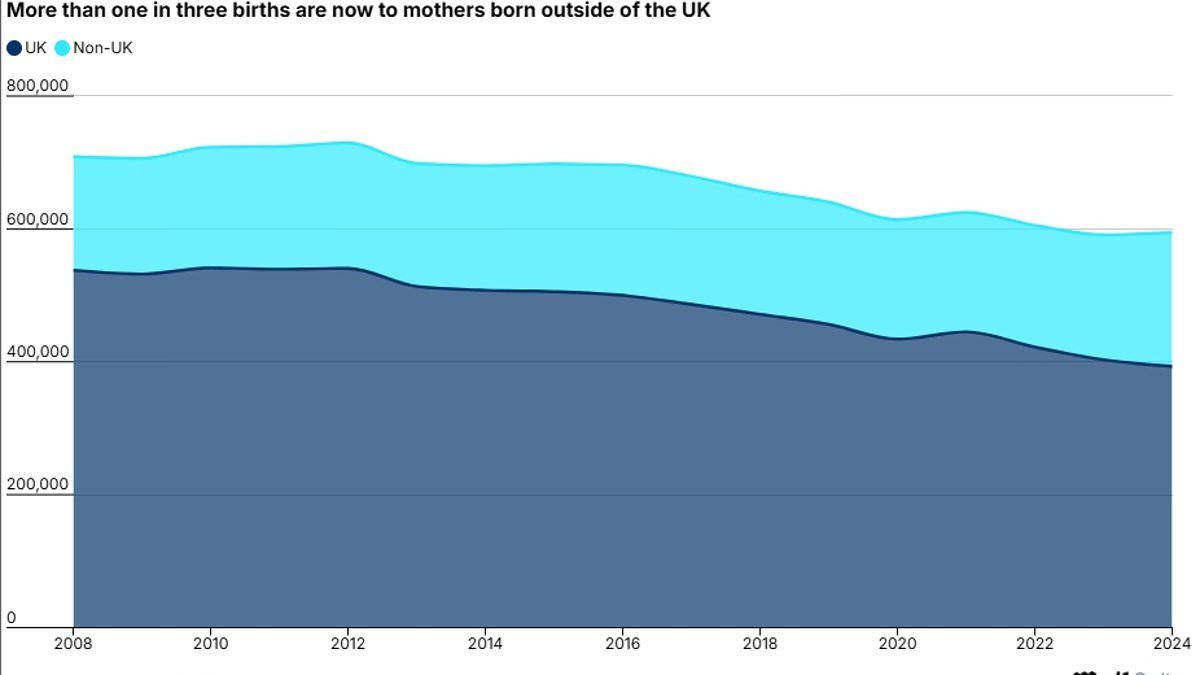By Editor James Tapsfield
A third of babies had a mother who was born outside the UK last year – as figures underlined the pace of change in society.
Official data reveal that non-UK-born women accounted for 33.9 per cent of live births in England and Wales in 2024 – up from 31.8 per cent the previous year and the highest on record. In 2009 the level was below a quarter.
Two-fifths of babies last year had at least one parent who was born in another country.
However, the proportion varied widely between 68 per cent in London, 44.4 per cent in Greater Manchester, 41.2 per cent in the West Midlands and just 22.6 per cent in the North East.
The ONS said there were 594,677 live births in England and Wales in 2024, which represented the first overall increase since 2021.
Births remain at historically low levels, with 2024 ranking as the third lowest total since 1977.
The rise was driven by the West Midlands, where births were up 3.38 per cent and London where they were up 1.8 per cent.
In contrast, numbers were stalled in the South East and down in the North East, South West, East Midlands, and Wales – which saw a 2 per cent dip.
The Office for National Statistics (ONS) breakdown also underlined the tendency for women to wait longer before having children.
The number of mothers aged under 20 dropped 4.6 percentage points year-on-year, and was down 2.35 percentage points for 20-24 year-olds.
Meanwhile, there were increases in all the maternal age categories over 30. Although the maternity rate decreased overall, it increased for those aged over 45.
There was an astonishing 14.2 per cent annual increase in births to fathers aged over 60. Some 942 births fell into the category in 2023, but there were 1,076 in 2024.
Greg Ceely, ONS head of population health monitoring, said: ‘In 2024, the annual number of births in England and Wales reverses the recent trend of declining births, recording the first increase seen since 2021.
‘Despite this overall rise, the number of births to mothers under 30 fell, as people continue to put off having children until later in life.
‘The largest decrease is seen amongst those under 20 years old, which fell by almost 5 per cent, while the number of mothers aged 35-39 grew the most.
‘A couple of other long-term trends are continuing, such as seeing around half of live births within marriage or civil partnership, and an increase in births to non-UK-born mothers.’
The figures come a day after Education Secretary Bridget Phillipson urged Britons to have more children and start families sooner, warning of ‘worrying repercussions’ from declining fertility rates.
‘A generation of young people have been thinking twice about starting a family, worried not only about rising mortgage and rent repayments, wary not only of the price of fuel and food but also put off by a childcare system simultaneously lacking in places and ruinously expensive,’ she told The Daily Telegraph.
Official figures have been showing that population change is being almost completely driven by immigration, which has been hitting record levels while deaths and births are largely in balance. Migrant mothers have tended to have higher birth rates, which have been falling among the wider population.
The ONS found India was the most common country of birth for non-UK-born mothers and fathers for the third year in a row.
India-born mothers accounted for 4.4 per cent of all live births, followed by Pakistan (3.6 per cent) and Nigeria (2.5 per cent).
Iraq has entered the top 10 for the first time, with 0.6 per cent.
